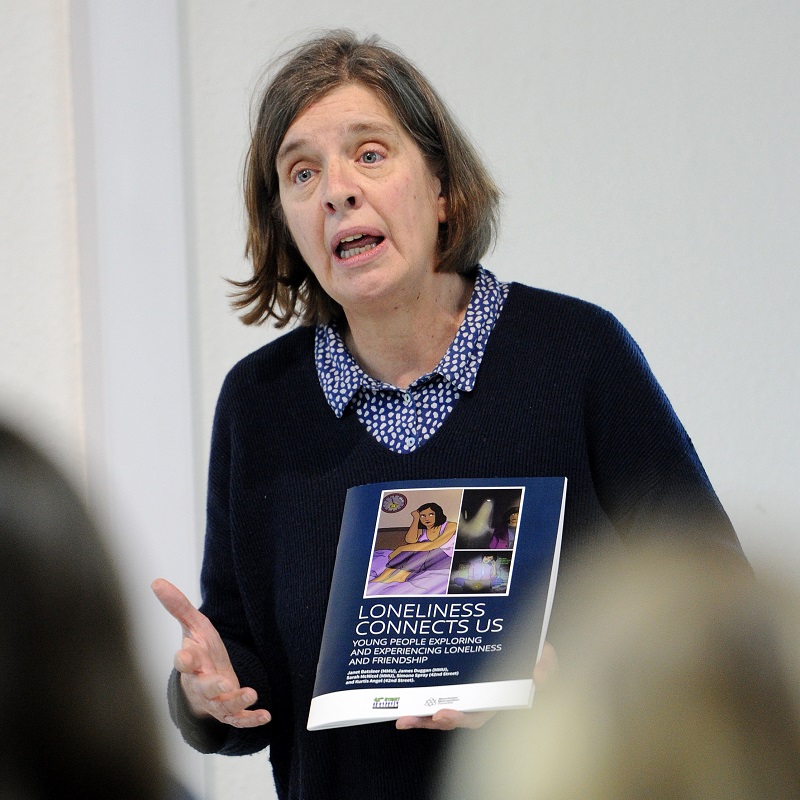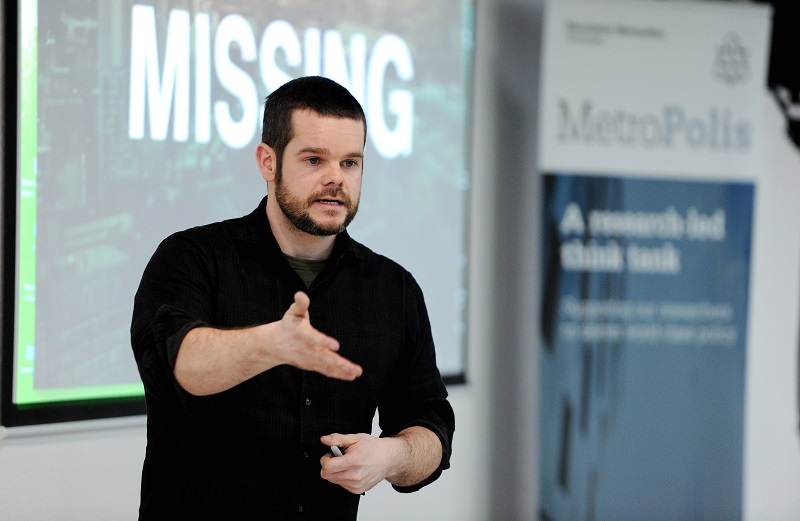‘Loneliness does not discriminate’
All of us feel lonely from time to time.
Yet when the longing for meaningful human contact and fellowship perseveres, it can become far more destructive than simply a bout of feeling low that soon passes.
Loneliness is traditionally perceived as physical solitude coupled with an absence of association with others.
It is particularly associated with the elderly, whose health limitations, shrinking circle of family and friends, and reduced access to diminishing services begin to restrict their day-to-day personal interactions.
But social isolation can strike at any age and afflict any kind of character: a BBC survey last summer found 40 per cent of those aged between 16 and 24 felt lonely compared with ‘only’ 27 per cent of the over-75s.
Youth loneliness a growing issue
Loneliness among young people is a serious and growing issue, despite them being part of the so-called most connected generation ever. A teenager or young adult may have hundreds of virtual friends and masses of positive online feedback, but in the end those connections can be superficial and unfulfilling. It does not mean they have sincere, deep and purposeful associations with anyone in the offline world.
Concern has been raised that exposure to images and stories from social media accounts that are contrived to demonstrate implausibly perfect lifestyles – where positivity, possessions and popularity are ostentatiously emphasised – can warp impressionable minds about the expectations of real life.
Whatever a person’s age, they may appear outwardly gregarious, happy and popular, but feel unappreciated, misunderstood, excluded or abandoned on the inside, and may feel disempowered and struggling for their voice to be heard.
Sometimes they may not realise they are lonely, or may not admit it to themselves or others due to feelings of embarrassment, failure or stoicism.
More seriously, the impact of loneliness on mental health can have repercussions on physical wellbeing too.
Researchers at Manchester Metropolitan University have been looking across the age spectrum at the causes of loneliness and how it manifests itself — and how society can combat it.
Dr Nora Andriopoulou, Senior Lecturer in Psychology, has studied the wider ways we connect and interact with other people and how these interactions affect our wellbeing.
She said:
Given the evidence of the importance of relationships for our psychological and physical wellbeing, it is rather worrying that social isolation is on the increase.
In a report carried out by the Mental Health Foundation in 2010, it was found that one in 10 individuals feels lonely and that one third of us have felt depressed as a result of feeling alone.
Unsurprisingly, loneliness has been associated with a number of psychological and physical problems such as higher blood pressure, poor sleep, lower immunity, a higher risk of developing Alzheimer’s disease, and poorer mental health, with a specific risk of experiencing depression and alcohol addiction.
Loneliness has been found to be as toxic as smoking 15 cigarettes a day and despite the fact that the Mental Health Foundation has produced a number of reports on the importance of close relationships and recommendations for policy makers, there are still no public health interventions to prevent loneliness and its toxic effects.
Much-needed social hubs
Dr Jenny Fisher, Senior Lecturer in Social Care, studied the effect Age UK Cheshire’s Men In Sheds project had in bringing older men together in much-needed social hubs.
The hubs – meeting places with a workshop space – enabled attendees to enjoy shared interests such as woodworking or a game of pool, or even just to chat over a cup of tea.
Dr Fisher said: “The number of older adults who live alone in the UK is increasing and while this is of concern for men and women, older men are particularly at risk of being lonely and socially isolated.
“Weak social connections, loneliness and social isolation are linked to poor health and wellbeing, especially for older men.
“We found that men often don’t have the same opportunities for social activities as women and older men are just less likely to join community groups.
“We also found it took a significant life event or facing a big issue, like retirement, loss of a spouse, or illness to get some older men to join.”

Manchester Metropolitan’s researchers found attendees of the hubs benefitted from reduced isolation, enhanced self-esteem and confidence, development of their skills, and the chance to engage in a physical activity, especially important if they live a largely sedentary lifestyle.
Dale Maskell, Chief Executive of Age UK Cheshire, said: “The work undertaken with Manchester Metropolitan and our sheds has really helped us in how we work with the shedders in evolving the shed communities.
“As a result of this work, we have improved how we communicate, with individuals who attend the sheds, how important community fundraising is.
“We have put a greater focus on explaining more carefully the need for each shed to generate income, so that we can sustain the sheds into the future.
“Another important area of work is how we better support diversity and inclusion in the sheds, and we are looking at different ways in which we can develop this aspect of the shed communities."

Understanding loneliness from teenagers
Despite the differences in age, experiences and outlooks, the issues around the loneliness experienced by Men In Sheds visitors are fundamentally the same opportunities and emotions that young people seek.
Manchester Metropolitan academics worked on the Loneliness Connects Us project in collaboration with Manchester-based mental health charity 42nd Street to help understand youth loneliness from the perspective of young people themselves.
Fourteen young co-researchers between the ages of 14 and 25 were trained how to discuss different experiences of loneliness sensitively with their peers from a range of diverse backgrounds.
Reflecting on the study, Janet Batsleer, Reader in Education, said: “I’d like to call it loneliness and friendship. It’s about both.
“It’s about how people experience loneliness during the early years of our lives, but also how young people are finding the solutions or suggesting some of the ways forward.
“While loneliness is not a mental illness it can connect to mental health difficulties and emotional disputes – it’s certainly emotionally distressing.”

Encouraging youngsters to express themselves
Young people were encouraged to express their views on loneliness through theatre productions – including an immersive piece that could inspire young audiences to think about loneliness in a new way – short films, sound productions, public art and craft.
Batsleer said: “We wanted to find a way of working with ourselves and the young people that got us past the defensive reaction of people saying ‘I’ve never been lonely’ and ‘I don’t think I can tell you anything about it’.
“I would be a bit worried if someone said to me they had never ever been lonely.
“We know it’s an experience that’s common and we know it’s hard to talk about, so using arts practice is a brilliant way to do that.”
The researchers looked at three aspects of the loneliness problem: social conditions of loneliness, the experience of loneliness, and ways of building friendship and connections.
They discovered poverty can exacerbate loneliness because people who cannot afford to travel beyond their neighbourhood remain isolated.
If a social gathering requires a financial outlay – buying food to take to a party, for example – and an individual cannot afford it, they may make excuses to not attend the function rather than turn up empty-handed and risk feeling humiliated or ostracised.
Other study participants recalled how they had felt isolated or shunned in their home town, particularly if they identified as gay, trans or non-binary, and may have moved to more cosmopolitan places, such as Manchester, for a more welcoming and receptive community.
Batsleer said: “Who do you admit to that you that are unhappy?
“The loneliness stems from not being able to talk to parents.
“The big emphasis in our society is: don’t go running to mum and dad, you better grow up, you better be strong and independent.
“That can be very difficult as a message. The very people you may have turned to in childhood are those you are now being pushed away from.
“What was interesting for me is that it is difficult if you fail, but it is also difficult if you do succeed but are not happy.”

Mobilizing findings
Young people said they can find themselves in a conundrum where they have worked hard to achieve academic success at the expense of friendships and now feel lonely.
Batsleer’s colleague on the Loneliness Connects Us project, Research Fellow Dr James Duggan, said: "One of things we wanted to do was not just understand loneliness from the perspective of young people, but start to mobilise knowledge and start to mobilise the findings that we and the young people made, and develop it and deliver it to different audiences.
“It’s thinking about how to take someone’s voice and amplify it, but also to change the location and the audiences to make sure it has the maximum impact for what they want to say.

“Loneliness does not discriminate. We often find young people and older people experience similar issues.”
The academics held events with decision-makers to share their findings and policy recommendations, including one at the Houses of Parliament jointly organised with the University of Bristol.
They advised creating inter-generational engagement projects where older and young people could mix and share their experiences of loneliness, and urged a rethink of how interventions are researched and funded, with less emphasis on linking funding to outcomes and more attention on taking the time to build community-based solutions.
Researchers suggested further research into how social media could be harnessed to reduce feelings of isolation.
They warned that the precariousness state of public funding of services designed to address loneliness is undermining efforts to build the key long-term personal relationships — not only between providers such as social workers and lonely people but among lonely people themselves trying to establish friendships with peers in similar circumstances.

'This is only the start'
Simone Spray, Chief Executive Officer of 42nd Street, said: “The creative approach to the peer research enabled the real experiences of young people to be voiced and the complexity of the issues and emotions surrounding youth loneliness to be captured – but this is only the start.
“It is important that we share and raise the profile of the insights and experiences of this growing issue for our young people and provide opportunities for discussion, social action and change.”
